Written by Bryan Dearsley
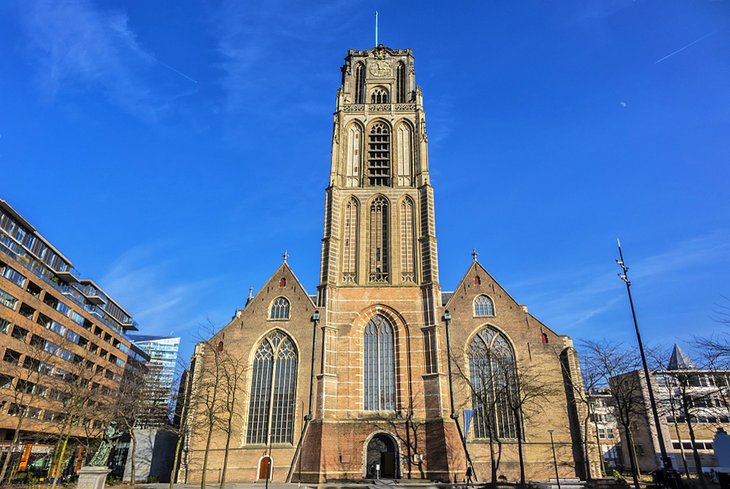
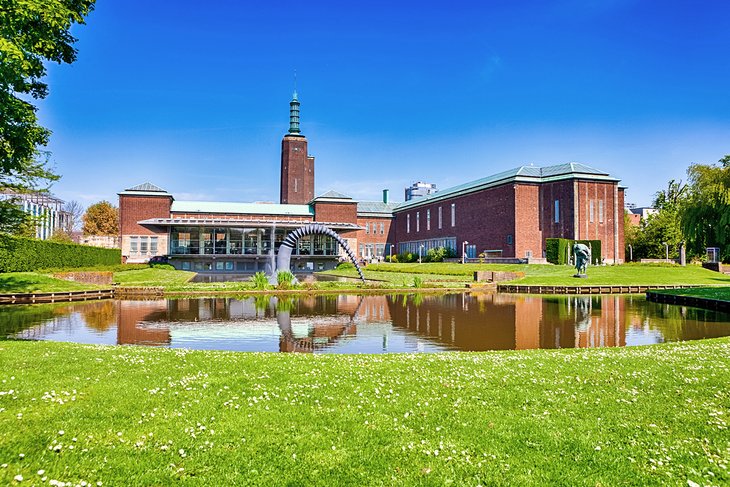
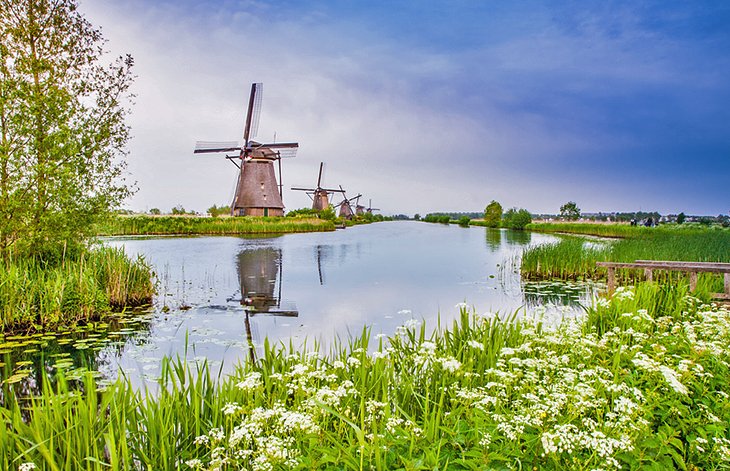


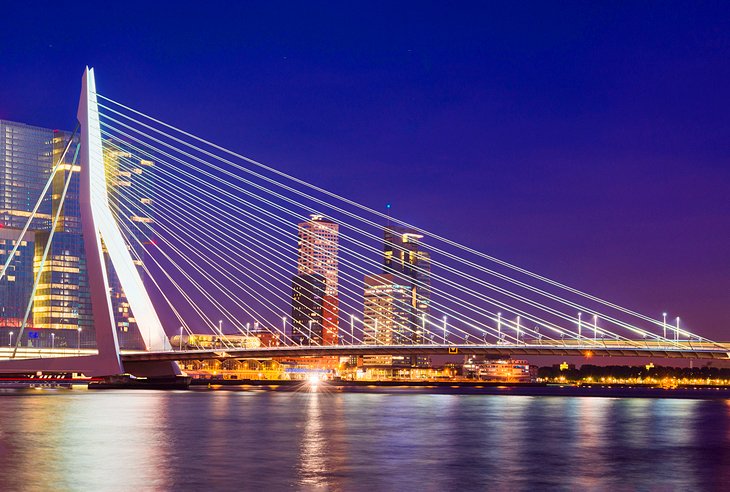

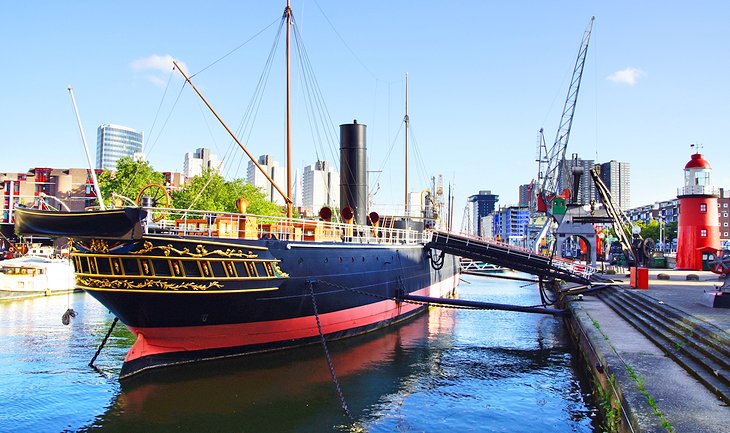
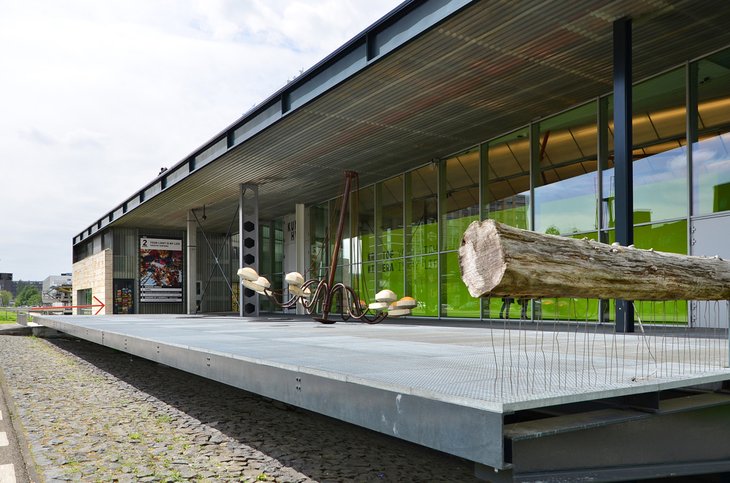
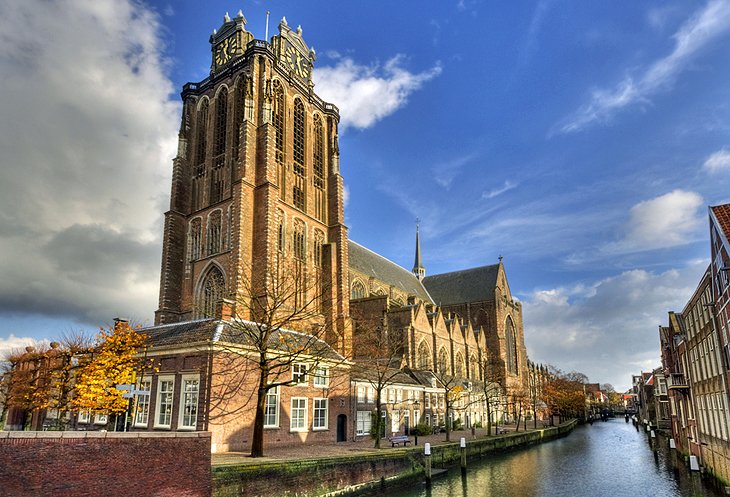
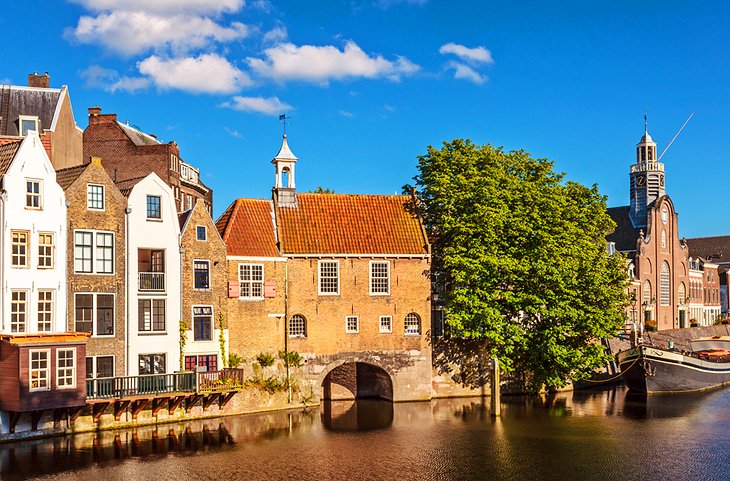
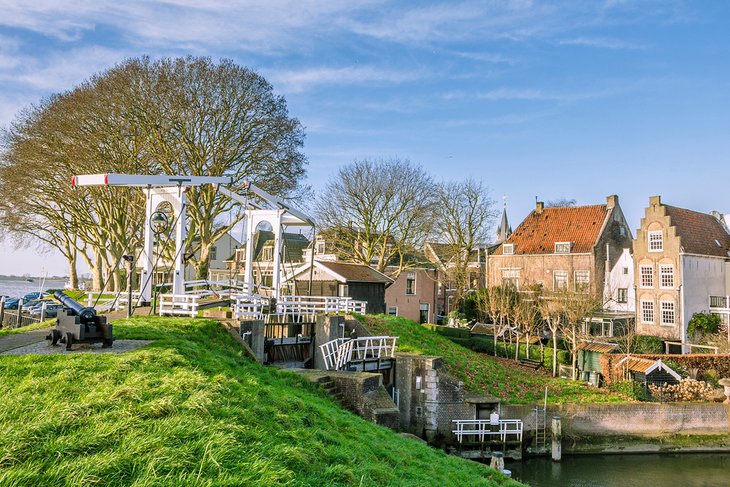
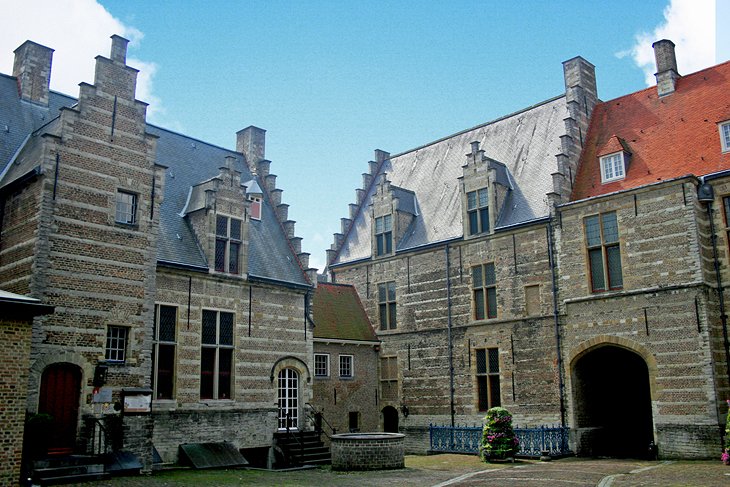
The second largest city in the Netherlands,
Rotterdam lies on both banks of the Nieuwe Maas, the tidal southern arm
of the Rhine, where it's joined by the little River Rotte. It's also
the world's largest port, home to the massive Europoort facility through
which so much freight passes on its way to and from the continent.
Although almost completely destroyed by German air attacks in 1940,
central Rotterdam was energetically rebuilt after the war and re-planned
with modern shopping streets, residential districts, and high-rises,
making it one of the most modern and architecturally interesting cities
in Europe.
Despite it's modernity, the city dates back to medieval times and was
already prosperous by the 13th century when a dam was built to separate
the Rotte from the Nieuwe Maas (hence the city's name). Rotterdam has
also long been important as a cultural hub, its early prosperity leading
to the birth of Rotterdam's most celebrated citizen, the humanist
Erasmus, born here in 1467. Today, it's as popular a destination for its
vibrant entertainment options as it is for its many fine museums and
splendid architecture.
1 Grote of Sint-Laurenskerk

Grote of Sint-Laurenskerk
Great St. Lawrence Church - Grote of Sint-Laurenskerk - is all that's
left of Rotterdam's medieval buildings, most of which were destroyed
during WWII. In Grote Kerkplein, Sint-Laurenskerk dates from the 15th
century and was built on once marshy ground giving the building a
peculiar lean that was only halted after its foundation was rebuilt in
1650. Upon entering the church, you'll be struck by the beauty of the
bright interior, an effect heightened by the colored glass of its
windows. The church is famous for its three Danish organs, the largest
of which stands on a marble base on the inside wall of the tower. The
bronze doors of the main entrance, on the theme of War and Peace,
are by the Italian artist Giacomo Manzu, and in front of the church is a
statue of Rotterdam's most famous son, Erasmus. Guided tours and
special tower climbs are available.
Address: Grotekerkplein 15, Rotterdam
2 Museum Boymans-van Beuningen

Museum Boymans-van Beuningen
Ira Smirnova
Museum Boijmans Van Beuningen, one of the Netherlands' most important
art establishments, is known around the world for its superb
collections of paintings, sculptures, and applied and decorative arts
from across Europe. Painters of the 14th to 16th centuries are
particularly well represented, with works by Hubert and Jan van Eyck,
Hieronymus Bosch, and Pieter Bruegel the Elder. The 17th century is
represented by Rembrandt and Rubens (26 of the latter's works can be
viewed), while later centuries are represented by Monet, Gauguin, and
Van Gogh. Contemporary painters represented include Picasso, Matisse,
and Chagall. Another museum of note is the Wereldmuseum Rotterdam,
an ethnographic museum established in 1883 with excellent displays of
artifacts from ancient and modern cultures from around the world.
Address: Museumpark 18, 3015 CX Rotterdam
Official site: www.boijmans.nl/en/
3 Kinderdijk's Windmills

Kinderdijk's Windmills
On the River Noord just 23 kilometers east of Rotterdam is the
beautiful little village of Kinderdijk (the "children's dyke"). Taking
its name from a famous legend that describes a baby's cradle being
stranded here during the St. Elizabeth's Day flood of 1421, it's one of
the most visited places in the Netherlands thanks to its 19 perfectly
preserved 18th-century windmills, each designated as a UNESCO World
Heritage Site. Built between 1722 and 1761, together they comprise the
largest surviving concentration of windmills in the country, a history
that's celebrated during special Mill Days when their sails are once again set in motion.
4 The Euromast

The Euromast
One of Rotterdam's most distinctive landmarks, the Euromast lies at
the north entrance to the Maas Tunnel. Erected in 1960, this
185-meter-high tower boasts two restaurants with superb views over
Rotterdam, each at the 92-meter mark. For thrill seekers looking for
more than just great views there's the chance to abseil down the
building, while those looking for a unique overnight stay can book one
of two stunning suites located at the 100-meter point. (English language
guided tours are available.)
Address: Parkhaven 20, 3016 GM Rotterdam
Official site: www.euromast.nl/en
5 Better by Design: The Cube Houses

Better by Design: The Cube Houses
Rotterdam is home to many fine examples of modern architecture, much
of it inspired by the city's waterside setting as well as a response to
the devastation of WWII. Pushing the architectural envelope to the max
are the city's famous Cube Houses (Kubuswoningen). Designed by Dutch
architect Piet Blom, this block of houses with their unique cube-shaped
upper stories can be enjoyed as part of a walking tour of the city (one
of them, the Show Cube, is open to the curious and contains displays
regarding the design and history of the buildings). Another
architectural gem is the White House (Witte Huis). Once Europe's
tallest building, this stunning ten-story Art Nouveau structure was
built in 1898 and is now a National Heritage Site with superb views from
its rooftop. Finally, those with an interest in the design of buildings
should visit the Netherlands Architecture Institute, home to a superb museum outlining the development of various architectural movements over the decades.
Address: Overblaak 70, 3011 MH Rotterdam
Official site: www.kubuswoning.nl/introkubuseng.html
6 Editor's Pick Europoort and Boat Tours

Erasmus Bridge
Rotterdam's massive port occupies half the city's total area of 247
square kilometers, much of it in turn occupied by Europoort, a huge
complex known as the Gateway to Europe. It's a fascinating area to visit
as part of a boat tour, and numerous tourist options are available
sailing from various locations around Rotterdam, often in conjunction
with tours of other parts of the city. In addition to countless massive
ships, you'll see mile after mile of quays and storage facilities built
to service the world's busiest port. One of the most popular excursions
begins at Maeslantkering near Hoek van Holland (Hook of Holland) and
includes a close-up look at the city's massive surge barrier. Evening
tours are also fun, especially with Rotterdam's most famous landmarks,
including the superb Erasmus Bridge, being spectacularly illuminated.
7 Diergaarde Blijdorp: The Royal Zoo

Diergaarde Blijdorp: The Royal Zoo
Established in 1857 - and one of the oldest zoos in the Netherlands -
Rotterdam's Royal Zoo (Diergaarde Blijdorp) makes for a very pleasant
outing. The zoo is well known for its successful breeding programs,
highlights of which include a number of young elephants, as well as the
rare red panda, fascinating creatures to watch as they explore the large
enclosures designed to resemble their natural habitats. Other features
of note are the Asian section, complete with a swamp forest with two
large aviaries for exotic birds, a Mongolian steppe, a bat cave, a
Chinese garden, and numerous creatures indigenous to the region. Also
worth exploring is the Oceanium, an excellent aquarium featuring a large
collection of marine life from the Americas.
Address: Blijdorplaan 8, 3041 JE Rotterdam
Official site: www.diergaardeblijdorp.nl/?lang=EN
8 Sea-Themed Museums and the City Center

Sea-Themed Museums and the City Center
Established in 1873, Maritime Museum Rotterdam provides a
fascinating look into the city's connection to the sea and its many
waterways. The museum boasts a large collection of material on the
history of shipping and seafaring, including ship models, a
reconstruction of a 2,000-year-old vessel, and numerous seafaring
paintings. Another marine-related tourist attraction is the adjoining Harbor Museum, an open-air facility that's home to the wonderfully preserved 19th-century Buffel,
an ironclad ram ship, as well as an old lightship (all told, more than
20 historic vessels are on display). Both facilities offer English
language guided tours. A recent addition to Rotterdam's roster of
important old vessels is the SS Rotterdam, launched in 1958 and
considered the finest Dutch-built passenger vessel. A truly memorable
experience is taking lunch or dinner aboard this sumptuously decorated
vessel, which is now a hotel and museum.
Walk about eight minutes north from the Maritime Museum and you'll come to Coolsingel, the main street of Rotterdam's city center. Here, you'll find the Town Hall (Stadhuis), built between 1914 and 1920 in Dutch Renaissance style, with a handsome tower graced by a carillon and a richly decorated interior. Opposite the Town Hall, in Stadhuisplein, is a war memorial designed by Mari Andriessen. Other Coolsingel highlights include the World Trade Center, a high-rise building with a facade of greenish-blue glass, and the Bijenkorf ("Beehive") department store (by Marcel Breuer, 1958). Fronting Bijenkorf is the 26-meter-high work of sculpture, Construction (1957), by Naum Gabo, a French sculptor of Russian origin. Wander a few blocks northwest from Bijenkorf, and you'll come to De Doelen, a concert hall and congress center rebuilt in 1966 after its destruction in 1940. It offers seating for 2,200 and excellent acoustics. Nearby is the Schouwburg (Municipal Theater), which opened in 1988.
Walk about eight minutes north from the Maritime Museum and you'll come to Coolsingel, the main street of Rotterdam's city center. Here, you'll find the Town Hall (Stadhuis), built between 1914 and 1920 in Dutch Renaissance style, with a handsome tower graced by a carillon and a richly decorated interior. Opposite the Town Hall, in Stadhuisplein, is a war memorial designed by Mari Andriessen. Other Coolsingel highlights include the World Trade Center, a high-rise building with a facade of greenish-blue glass, and the Bijenkorf ("Beehive") department store (by Marcel Breuer, 1958). Fronting Bijenkorf is the 26-meter-high work of sculpture, Construction (1957), by Naum Gabo, a French sculptor of Russian origin. Wander a few blocks northwest from Bijenkorf, and you'll come to De Doelen, a concert hall and congress center rebuilt in 1966 after its destruction in 1940. It offers seating for 2,200 and excellent acoustics. Nearby is the Schouwburg (Municipal Theater), which opened in 1988.
Address: Leuvehaven 1, 3011 EA Rotterdam
Official site: www.maritiemmuseum.nl/en
9 Kunsthal: Rotterdam's Art Hall

Kunsthal: Rotterdam's Art Hall
inge hoefnagel
Another example of Rotterdam's modern-yet-functional architecture is
the Kunsthal, or Art Hall. This trendy gallery opened in 1992 and hosts a
variety of constantly changing exhibits of visual arts, design,
architecture, and culture from across the globe. Another gallery of note
is the Chabot Museum featuring the works of Dutch painter and
sculptor Henk Chabot, housed in a superb white villa built in 1938. For
those with an interest in photography, a visit to the Netherlands Photo Museum
(Nederlands Fotomuseum) is time well spent; highlights include a broad
collection of historical images by numerous Dutch photographers.
Address: Museumpark, Westzeedijk 341, 3015 AA Rotterdam
Official site: www.kunsthal.nl/en-2-Kunsthal-Rotterdam.html
10 The Church of Our Lady (Grote Kerk), Dordrecht

The Church of Our Lady (Grote Kerk), Dordrecht
About 24 kilometers southwest of Rotterdam in the town of Dordrecht,
the Church of Our Lady (Onze Lieve Vrouwekerk) has one of the most
picturesque settings of any Dutch church. Built on the site of an
earlier 15th-century church, it overlooks a quaint canal that dissects
the old town center. As a result of a fault in construction, the tower
began to sink, resulting in its present half-finished appearance (it was
later topped by four Baroque clock faces and a carillon of 49 bells).
Interior highlights include its magnificent oak choir-stalls, carved in
Renaissance style in 1541 and the finest of their kind in the
Netherlands, along with stained glass windows depicting important events
in the town's history. Also of note is the large organ, built in 1671
and decorated with the coats of arms of Dordrecht. Afterwards, be sure
to explore Dordrecht itself, famous for its many surviving historic
buildings such as the Old Town Hall (Stadhuis) from 1544.
Address: Groenmarkt, Dordrecht
11 Delfshaven and the Pilgrim Fathers

Delfshaven and the Pilgrim Fathers
The old district of Delfshaven, which unlike much of Rotterdam
survived WWII largely unscathed, is consequently one of the most popular
spots in this big bustling city. Famous as the birthplace of Admiral
Piet Hein, a 16th-century hero of the country's long war against Spain,
it's also where, in the Old Church (Oude Kerk), the last service was
held in 1620 by the Pilgrim Fathers before sailing for the New World
(the event is commemorated with a memorial and bronze tablet). Also
worth visiting is Dubbelde Palmboom Museum housed in a
19th-century warehouse containing a large collection of material on the
history of Rotterdam, including archaeological finds, implements, and
equipment.
12 Schoonhoven

Schoonhoven
bertknot
Schoonhoven, halfway between Rotterdam and Utrecht, is a wonderful excursion due to its many superbly preserved medieval buildings. A must-see is St. Bartholomeuskerk,
founded in the 13th century and notable for its tendency to lean off
the vertical, and its stalls carved with scenes from the life of Christ.
Other features are the 17th-century pulpit with its figures of the 12
Apostles, and the tomb of Olivier van Noort, the first Dutchman to
circumnavigate the globe in the early 1600s. The Schoonhoven Town Hall
(Stadhuis) is also worth a look. Built in 1452 in Late Gothic style but
much altered in later centuries, it possesses a domed hexagonal tower
containing a carillon of 50 bells. Other town highlights include the
picturesque Weigh House (Waag) from 1617 on top of a dam above
the harbor; the Gold, Silver, and Clock Museum (Nederlands Goud-, Ziver-
en Klokkenmuseum) with its displays relating to the crafts of gold- and
silversmithing and clock making; and the Edelambachtshuis, a granary built in 1566 that now houses a collection of jewelry from the 1600s to the 1900s.
Day Trips from Rotterdam

Markiezenhof Palace
Many pleasant excursions await within an easy commute of Rotterdam. One of the most popular is Bergen op Zoom,
a historic old town some 67 kilometers south that is noted for its
large squares and pleasant pedestrian zones. It's also where you'll find
Markiezenhof Palace, a 15th-century mansion that now houses a
cultural center and museum with numerous fine paintings and period
furniture. Also worth a visit are Breda, 52 kilometers southeast of Rotterdam, with its museums and monuments, and the town of Gorinchem, 44 kilometers to the east. Another must-see is the Witches Weighhouse (Museum
de Waag) in Oudewater, famous for once having been used to weigh those
suspected of witchcraft; if you were considered light enough to ride a
broomstick, the theory was that you were a witch (fortunately for the
women of Oudewater, none of the accused were considered light enough to
be punished). About 70 kilometers from Rotterdam, Zierikzee on
the island of Schouwen-Duiveland lures tourists with its yacht harbor, a
picturesque old town center, and beautiful beaches fringed by wooded
dunes.
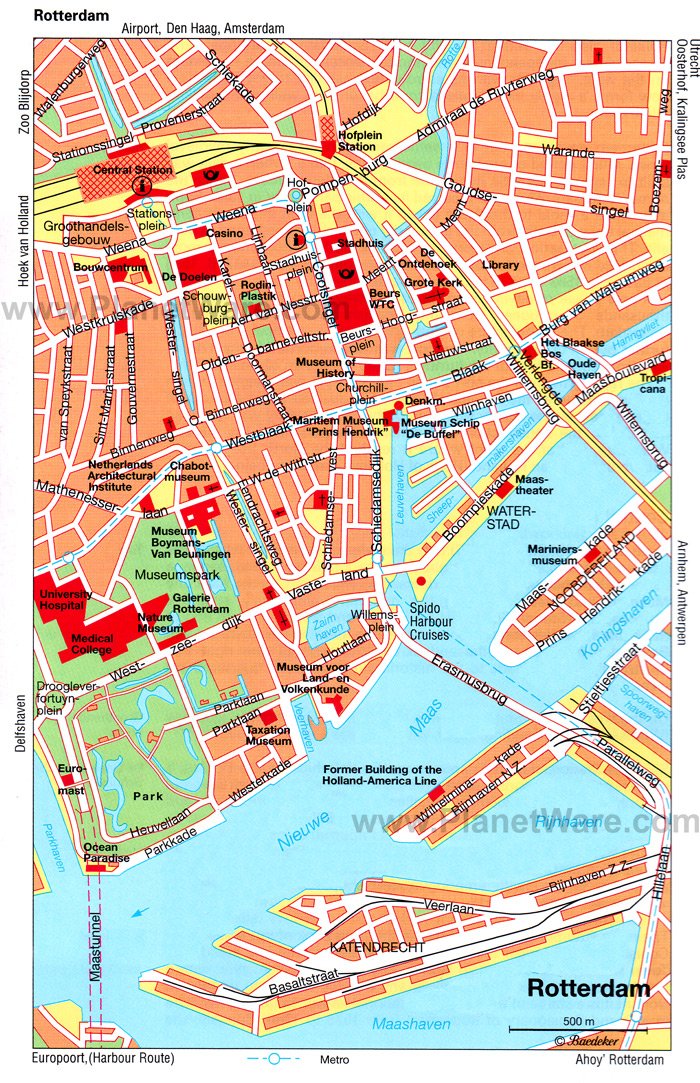
No comments:
Post a Comment